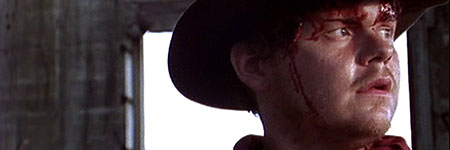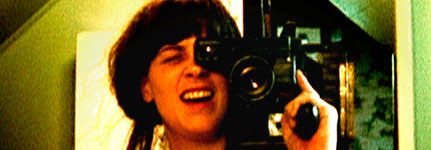Exhibition Program Archive
Winter/Spring 2007 - A Living History of 16mm
All films shown in 16mm unless otherwise noted.- March 27 - Re-Enactments: Three Films by Ben Russell
- April 3 - Demon Lover Diary by Joel DeMott
- April 17 - Time Being: Two Films by Gunvor Nelson
RE-ENACTMENTS: THREE FILMS BY BEN RUSSELL
March 27, 2007 - 7PM
Whitsell Auditorium 1219 SW Park Avenue

Filmmaker in attendance.
BLACK AND WHITE TRYPPS NUMBER ONE
(2005, B&W/silent, 7 mins)
A theory of origins, a film for the stars and planets exploding all around
our heads. Hypnosis is imminent.” A psychedelic op-art film that
references the traditions of hand-painted Avant-Garde cinema by replacing
it with something entirely different.
TERRA INCOGNITA
(2002, color/sound, 10 mins)
A pinhole film, a cheap robot voice, a makeshift history. An explorer’s
tale of the unknown part of the world.Terra Incognita is a lensless film
whose cloudy pinhole images create a memory of history. Ancient and modern
explorer texts of Easter Island are garbled together by a computer
narrator, resulting in a forever repeating narrative of discovery,
colonialism, loss and departure.
THE TWENTY-ONE LIVES OF BILLY THE KID
(2005, color/sound, 55 mins)
Shot in the abandoned buildings of Gary, Indiana and the cornfields of
Western Illinois, The Twenty-One Lives of Billy the Kid presents a
fractured historical narrative without any real protagonist, one in which
the titular character goes mostly unseen - Billy the Kid as the
always-off-screen assailant, as a ghost’s laugh, as a shadow on the road.
A single actor (Dave Grant as the Cowboy) plays the roles of Billy’s
twenty-one victims and is covered in blood by the film’s end; with each
murder comes a resurrection, and with each resurrection another bloody
murder. The ghost towns of today are substituted for the frontier towns of
the Old West, and the Cowboy is shepherded through this desolate landscape
by the Nurse and the Soldier (Sharon Ambielli and Erik Fabian) – the
forgotten souls of a violent and divisive war. Based almost entirely on
historical accounts leading up to and surrounding the events of the 1877
Lincoln County War in New Mexico, The Twenty-One Lives of Billy the Kid
employs a series of re-enactments that produce History as its main
character in an effort to unravel it.
Ben Russell currently resides in Chicago, filmmaking and programming films for the once Providence, Rhode Island-based and now iternerant Magic Lantern Cinema. Russell’s films trace the contours of history asking us to consider the shape and form of historical accounts. His films have shown internationally at the Museum of Modern Art, Rotterdam Film Festival, Images Forum Tokyo, London Film Festival, Pleasure Dome (Toronto), and in Basel, Switzerland and Zagreb, Croatia. Russell currently teaches film production at The School of the Art Institute of Chicago.
DEMON LOVER DIARY by Joel DeMott
April 3, 2007 - 7PM
Whitsell Auditorium 1219 SW Park Avenue

"In the fall of 1975, cameraman Jeff Kreines was hired to shoot a low-budget horror movie called Demon Lover for Don Jackson and Jerry Younkins, two amateur aspiring directors from Michigan who grew up on comic books and slasher flicks. Joel DeMott joined Kreines for the trip, and with her own camera set out to document this haphazard foray into B-movie film-making. The result is a simultaneously disturbing and fascinating behind-the-scenes record, entitled Demon Lover Diary. At times scarier and frequently funnier than the film being created, DeMott and Kreines’s documentary provides unflinching insight into the chaotic and occasionally violent behavior that transpired on location."
Born in Washington DC, Joel DeMott attended Radcliffe College and the Massachuettes Institute of Technology. DeMott, who now resides in Coosada, Alabama with her partner and long-time collaborator Jeff Kreines, has made a number of films about the South: Montgomery Songs, Down on the Farm, 36 Girls, God & Country, and Goldbug Street. Demon Lover Diary won the Los Angeles Film Critics Award for Best Independent Feature, and has screened in London, Edinburgh, Berlin, Rotterdam, Sydney, Hong Kong, Taiwan, Athens, and The Hague.
Demon Lover Diary
(1980, 16mm color/sound, 90 mins)
TIME BEING: TWO FILMS BY GUNVOR NELSON
April 17, 2007 - 7PM
Whitsell Auditorium 1219 SW Park Avenue

MY NAME IS OONA
(1969, color/sound, 10 mins)
“But the revelation of the program is Gunvor Nelson, true poetess of the
visual cinema. My Name Is Oona captures in haunting, intensely lyrical
images fragments of the coming to consciousness of a child girl. A series
of extremely brief flashes of her moving through night-lit space or woods
in sensuous negative, separated by rapid fades into blackness, burst upon
us like a fairy-tale princess, with a late sun only partially outlining
her and the animal in silvery filigree against the encroaching darkness;
one of the most perfect recent examples of poetic cinema. Throughout the
entire film, the girl, compulsively and as if in awe, repeats her name,
until it becomes a magic incantation of self-realization.”
RED SHIFT
(1984, B&W/sound, 50 mins)
“It involves Gunvor Nelson, her mother and her daughter. Carefully and
with great tenderness, it focuses on these three women, trying to show us
their relationship, succeeding with an emotional impact that is hardly
ever found in such a subject. It is not the social context which is
exploited but the little gestures, everyday events. Red Shift is a radical
film; it sets new measures for avant-garde filmmaking dealing with
personal problems.”
“A meditation on the emotional relationships between three generations of women, explored via daily gestures, everyday events, and disjunctive aural traces. Set in the filmmaker’s childhood home in Sweden, the film, made with the assistance of Diane Kitchen, is interwoven with voice-over readings of Calamity Jane’s letters to her daughter.”
“One of the few women to emerge from San Francisco’s heady independent film scene of the 1960s, Swedish filmmaker Gunvor Nelson has produced one of the great bodies of work in experimental film. Her films are at once intimate studies of life’s emotional landscapes and sensual explorations of image and sound, built up through lush compositions and lyrical montages. Nelson has created works that are distinct and exciting. She has become one of the most accomplished and celebrated artists from the avant-garde film world.”
View more programs in the Exhibition Program Archive